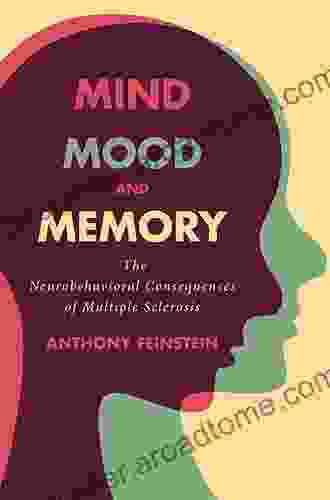The Neurobehavioral Consequences of Multiple Sclerosis: A Comprehensive Guide for Healthcare Professionals

Multiple Sclerosis (MS) is a chronic inflammatory disease of the central nervous system (CNS) characterized by demyelination and axonal damage. Beyond the physical symptoms associated with MS, such as motor and sensory disturbances, a significant proportion of patients also experience a wide range of neurobehavioral consequences. These neurobehavioral manifestations can have a profound impact on the individual's quality of life, cognition, and overall well-being.
5 out of 5
| Language | : | English |
| File size | : | 2833 KB |
| Text-to-Speech | : | Enabled |
| Screen Reader | : | Supported |
| Enhanced typesetting | : | Enabled |
| Word Wise | : | Enabled |
| Print length | : | 256 pages |
Cognitive Impairment
Cognitive impairment is a common neurobehavioral consequence of MS, affecting nearly half of all patients. It encompasses a range of deficits, including:
- Attention and concentration difficulties
- Memory impairments
- Executive function deficits (e.g., planning, organizing, decision-making)
- Language problems
Cognitive impairment in MS can significantly interfere with everyday activities, such as work, school, and social interactions.
Emotional Disturbances
Emotional disturbances are another common neurobehavioral consequence of MS, affecting up to 60% of patients. These disturbances can include:
- Depression
- Anxiety
- Mood swings
- Irritability
- Emotional lability
Emotional disturbances can negatively impact the patient's quality of life and relationships, and they may contribute to suicidal thoughts.
Fatigue
Fatigue is one of the most common and debilitating symptoms of MS. It can range from mild to severe and can significantly interfere with everyday activities. Fatigue in MS is often characterized by:
- Persistent and overwhelming exhaustion
- Difficulty initiating and sustaining physical or mental activities
- Cognitive difficulties
- Sleep disturbances
Fatigue can significantly reduce the patient's quality of life and ability to work or engage in social activities.
Depression
Depression is a common comorbidity in MS, affecting approximately 35% of patients. It is often characterized by:
- Persistent sadness or low mood
- Loss of interest or pleasure in activities
- Changes in appetite or sleep
- Feelings of worthlessness or guilt
- Suicidal thoughts
Depression in MS can significantly impact the patient's quality of life and overall health.
Management and Support
The management of neurobehavioral consequences of MS requires a multidisciplinary approach involving neurologists, psychologists, and other healthcare professionals. Effective management strategies include:
- Cognitive Rehabilitation: This involves individualized interventions designed to improve cognitive function and compensate for deficits.
- Pharmacological Treatment: Antidepressants, anti-anxiety medications, and stimulants may be prescribed to manage emotional disturbances and fatigue.
- Psychotherapy: Cognitive-behavioral therapy, interpersonal therapy, and mindfulness-based interventions can help address emotional disturbances and enhance coping mechanisms.
- Fatigue Management Strategies: These include lifestyle modifications, energy conservation techniques, and physical therapy.
- Social Support: Support groups, counseling, and family involvement can provide emotional support and coping mechanisms.
Prognosis
The prognosis of neurobehavioral consequences in MS varies depending on the individual patient and the severity of their disease. Some patients may experience persistent symptoms, while others may experience improvement over time. Early diagnosis and intervention are crucial for improving outcomes and maximizing the patient's quality of life.
The neurobehavioral consequences of Multiple Sclerosis pose significant challenges for both patients and healthcare professionals. Understanding these consequences and implementing effective management strategies are essential for optimizing the well-being and quality of life of individuals with MS. By providing a comprehensive overview of these consequences, this article empowers healthcare professionals with the knowledge and tools to effectively support their patients.
5 out of 5
| Language | : | English |
| File size | : | 2833 KB |
| Text-to-Speech | : | Enabled |
| Screen Reader | : | Supported |
| Enhanced typesetting | : | Enabled |
| Word Wise | : | Enabled |
| Print length | : | 256 pages |
Do you want to contribute by writing guest posts on this blog?
Please contact us and send us a resume of previous articles that you have written.
 Book
Book Novel
Novel Page
Page Chapter
Chapter Text
Text Story
Story Genre
Genre Reader
Reader Library
Library Paperback
Paperback E-book
E-book Magazine
Magazine Newspaper
Newspaper Paragraph
Paragraph Sentence
Sentence Bookmark
Bookmark Shelf
Shelf Glossary
Glossary Bibliography
Bibliography Foreword
Foreword Preface
Preface Synopsis
Synopsis Annotation
Annotation Footnote
Footnote Manuscript
Manuscript Scroll
Scroll Codex
Codex Tome
Tome Bestseller
Bestseller Classics
Classics Library card
Library card Narrative
Narrative Biography
Biography Autobiography
Autobiography Memoir
Memoir Reference
Reference Encyclopedia
Encyclopedia Leighton Lovelace
Leighton Lovelace Bucky Sinister
Bucky Sinister Raffaele Cecco
Raffaele Cecco Annemarie Riley Guertin
Annemarie Riley Guertin Anna Chris
Anna Chris Arthur E Jongsma
Arthur E Jongsma Anne Apfel
Anne Apfel Arlene Uhl
Arlene Uhl Anne Darling
Anne Darling Anne Campbell
Anne Campbell Anna Velfman
Anna Velfman Sarah Burch
Sarah Burch Anne Lamott
Anne Lamott Fay Sampson
Fay Sampson David H Chenoweth
David H Chenoweth Nicole Detraz
Nicole Detraz Michael Arndt
Michael Arndt Lene Rachel Andersen
Lene Rachel Andersen Ashley Adams
Ashley Adams Lu Yen Chang
Lu Yen Chang
Light bulbAdvertise smarter! Our strategic ad space ensures maximum exposure. Reserve your spot today!

 Davion PowellNurturing Gratitude in Young Hearts: Developing Gratitude in Children and...
Davion PowellNurturing Gratitude in Young Hearts: Developing Gratitude in Children and... Jerry WardFollow ·18.3k
Jerry WardFollow ·18.3k Thomas HardyFollow ·7.7k
Thomas HardyFollow ·7.7k Dean CoxFollow ·7k
Dean CoxFollow ·7k Hugo CoxFollow ·18.9k
Hugo CoxFollow ·18.9k Alex FosterFollow ·6.6k
Alex FosterFollow ·6.6k Michael ChabonFollow ·4k
Michael ChabonFollow ·4k Edgar Allan PoeFollow ·14.9k
Edgar Allan PoeFollow ·14.9k Mitch FosterFollow ·15.5k
Mitch FosterFollow ·15.5k

 Jeremy Cook
Jeremy CookDrawing and Illustrations of the 18th Century: A Journey...
Step into the...

 Easton Powell
Easton PowellPhysician Experience With Obstructive Sleep Apnea: The...
Obstructive sleep apnea (OSA) is a common...

 Cruz Simmons
Cruz SimmonsUnlock Your Inner Healer: The Transformative Power of...
Are you ready to embark on a profound healing...

 Paulo Coelho
Paulo CoelhoTransmission Awakening In Time Of Transition Vol. 1: A...
Transmission Awakening...
5 out of 5
| Language | : | English |
| File size | : | 2833 KB |
| Text-to-Speech | : | Enabled |
| Screen Reader | : | Supported |
| Enhanced typesetting | : | Enabled |
| Word Wise | : | Enabled |
| Print length | : | 256 pages |














